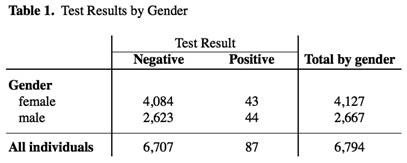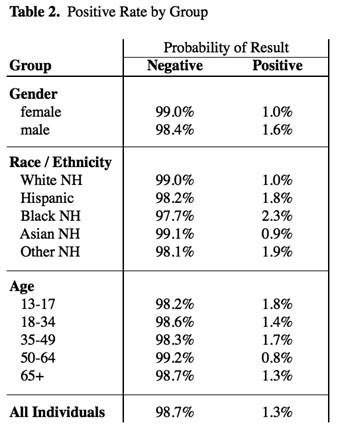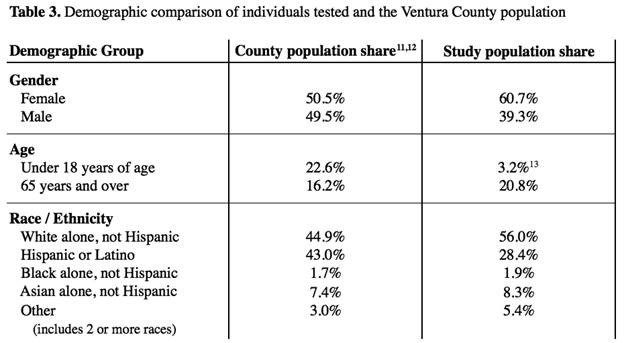THOUSAND OAKS – Since May 2020 researchers from UCI, UCLA, California Lutheran University, and 11Health have been collaborating with Ventura County agencies to determine the true prevalence of COVID-19 within the region. This research is in partnership with the Ventura County Healthcare Agency, Oxnard Fire Department, Ventura City Fire Department and Dignity Health’s St. John’s Hospital and has been made possible through the support of the Ventura County Community Foundation, the Health Care Foundation for Ventura County and the Office of Assemblymember Jacqui Irwin.
Free COVID-19 antibody tests have been offered at multiple locations throughout the county with specific efforts to ensure testing was representative of the region’s diverse population. To date, over 10,000 individuals have volunteered for testing which involves a painless blood draw followed by a questionnaire that provides crucial data to help researchers understand and interpret the test results. Results are made available to participants a short time after testing takes place.
Today, we are releasing the results of a focused period of testing that took place between June 22 and July 6, 2020 in Ventura County. As such, these results can be considered a representative snapshot of that moment in time for the population that was tested.
Why do this research?
The true rate of COVID-19 transmission remains poorly understood and is likely to vary from place to place considerably. This study will provide important insights to public health officials and local policy makers. The goal is to provide information that will support targeted policy responses to any increase in community transmission which results from the re-opening of businesses across Ventura County and any seasonal resurgence or other “second wave” of transmission.
“The partners in this study have come together seamlessly to provide Ventura County residents with a world class antibody study,” said Assemblymember Jacqui Irwin. "The extraordinary effort by the Ventura County Healthcare Agency and its partners over the two weeks in late June and early July have gone a long way to ensure that local and state officials have actionable data on the spread of COVID-19 in Ventura County.”
Results and additional information on the study included below:
What is an antibody test?
Antibodies are proteins that help fight off infections and can provide protection against getting that disease again (immunity). Antibodies are disease specific. For example, measles antibodies will protect you from getting measles if you are exposed to it again, but they won’t protect you from getting mumps if you are exposed to mumps.
In this research participants are tested for a specific IgG antibody using the ‘Abbott Architect SARS-COV-2’ IgG test, which may indicate a past infection with the virus that causes COVID-19.
What does a positive antibody test mean?
According to the CDC, having antibodies to the virus that causes COVID-19 may provide protection from getting infected with the virus again. Because this virus is so new, we do not know how much protection the antibodies may provide or how long this protection may last.
For this reason individuals who test positive are urged to continue protecting themselves and others since it may be possible that individuals could get infected with the virus again. The importance of this research is that we are adding to the knowledge about COVID-19, the associated antibodies and any protection that those antibodies confer.
What did the June 22 to July 6 antibody tests reveal?
- 6,794 individuals were tested during the 2-week period from June 22 to July 6, 2020. Of those individuals tested, 4,127 or 60.7% were female while 2,667 were male (see Table 1).

- In total, 87 individuals were found to have a positive test, representing 1.3% of the tested population. Among the men, 1.6% (or 44 males) tested positive while 1.0% (or 43) of the women tested positive (see Table 2).
- Individuals who reported their race/ethnicity as Hispanic, Black non-Hispanic, or Other non-Hispanic, had higher rates of positive tests than those reporting as White or Asian non-Hispanic (1.8%, 2.3%, and 1.9%, respectively, compared to 1.0% and 0.9%). (See Table 2).

- Positive rates also varied by age, with higher rates among younger age groups. The two oldest age groups (50-64 and 65+) had the lowest rates, at 0.8% and 1.3%, respectively (see Table 2).
Are these results representative of Ventura County’s population?
Although the study went to some lengths to collect data from a representative cross section of Ventura County’s population, there were some important differences between the group of individuals that was tested and the general County population. Compared to census data for Ventura County, the individuals that were tested between June 22 and July 6 were more likely to be female and white. Test participants were less likely to report their ethnicity as Hispanic or Latino.

How do these results compare to what is already known?
It is difficult to directly compare results between different antibody studies. Each study uses different methods and is carried out at different times during the current pandemic and across different geographies. Over the past several months, other studies have produced estimates of prevalence such as 1% in San Francisco, 2.8% in Santa Clara County and 4.7% in Los Angeles County. By comparison, one New York City antibody study estimated infection rates as high as 20.2%.
Unfortunately, it is not possible to look at the Ventura County results and conclude whether the disease is more or less prevalent here than in the other regions of California which have been tested.
What further research is planned?
We will continue to collect data over future incubation cycles to track how rates of infection may be changing over time in Ventura County. We are also looking at how antibody levels vary between people with different types of employment or exposure. We are also conducting repeated testing in a subset of patients to see how long antibodies tend to last in the body and will release our findings to the public, policy makers and the peer-reviewed literature as they become available.
“While this initial survey reveals Ventura County’s early COVID-19 infection rates, it is important to remember that the county has undergone a recent surge in cases,” cautioned Dr. Todd Larsen, Chair of the Department of Emergency Medicine at St. John’s Regional Medical Center. “We have seen cases increase from June into July, with the most significant peak occurring in late July. The antibody testing planned for the coming months will provide critical insight into this surge and will also provide important information about how long antibodies remain in the body.”
Additional antibody testing is planned for the first week of October throughout Ventura County. For more information and data related questions, please contact Matthew Fienup (805)320-2739.
###